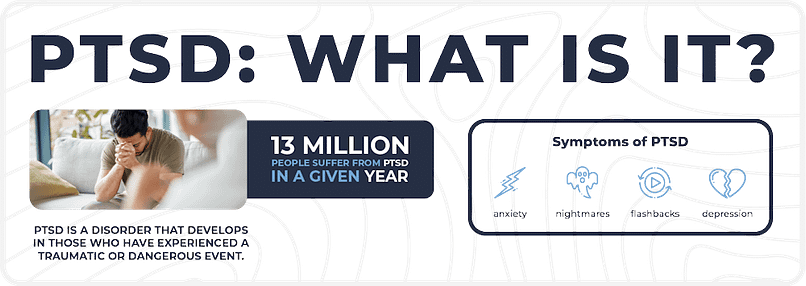Check out the following blogs to learn more about PTSD treatment:

Healing Begins Here

WHAT IS PTSD?
PTSD may last for months or years after traumatic events. Not everyone experiences this level of trauma from the same type of events. However, people with PTSD suffer:
- Ongoing anxiety
- Agitation
- Depression
- Nightmares
- Memory loss
- Flashbacks
The symptoms of PTSD can be very severe and can severely affect a person’s quality of life. A study by the National Institutes for Mental Health found that nearly 5 million Americans suffer from PTSD. This number is disproportionately higher in military veterans at 10%–17% compared to 1%–3% in the general population.
The symptoms of PTSD are categorized into these four main groups:
- Re-experiencing
- Avoidance/Numbing
- Arousal
- Cognition (Thought processes)
People with PTSD will often focus on the re-experiencing symptoms since they are often the most visible. Some individuals with PTSD have been known to have hallucinations or delusions regarding these symptoms. In addition, there may be physical symptoms such as a headache or stomach ache.
Those who experience PTSD will often try to avoid triggers that lead them to think about their traumatic events. In addition, they may often feel angry and/or anxious in response to triggers that cause them to relive their traumatic experiences.
A PTSD TREATMENT CENTER IN PORTLAND, OREGON IS WHAT YOU NEED
Crestview Recovery in Portland, Oregon provides effective PTSD treatment to help those in need. We offer a variety of therapies and programs that are designed to help patients heal from their trauma and move on with their lives. Our compassionate staff is here to support you every step of the way.
PTSD treatment at Crestview Recovery begins with a comprehensive evaluation to determine the best course of treatment. We offer both inpatient and outpatient programs, depending on the needs of the patient. Inpatient treatment is typically recommended for those who are struggling with more severe symptoms or who have not been successful in previous attempts at outpatient treatment.
Our inpatient program includes individual, group, and family therapy, as well as medication management and other services. The goal of treatment is to help patients develop the skills they need to cope with their symptoms and triggers. We also work with patients to address any underlying issues that may be contributing to their disorder.
Outpatient treatment is typically recommended for those who are struggling with less severe symptoms. Our outpatient program includes individual and group therapy, as well as medication management and other services. The goal of treatment is to help patients develop the skills they need to cope with their symptoms and triggers. We also work with patients to address any underlying issues that may be contributing to their disorder.

GET HELP TODAY
If you or someone you love need help for PTSD and addiction, Crestview Recovery provides that important treatment. Call us now at (866)262-0531 for more information about available programs.





















